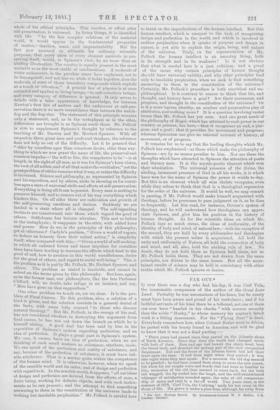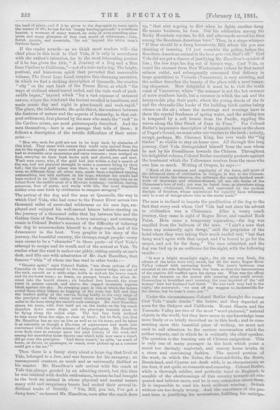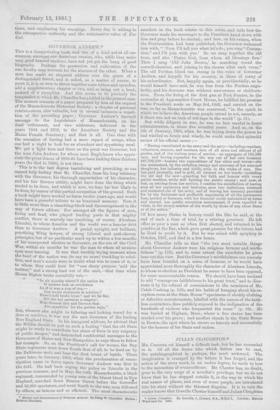PAR OUT.* Is ever there was a dog who had
his day, it was Cerf Vola, the inestimable companion of the author of the Great Logo Land. Probably he was unconscious of his fame, but he surely must have been aware and proud of his usefulness ; and if for faithful servants of his kind there be a tribunal, not one of them can ever have "handed in his checks " with serener security than the noble " Husky," to whose memory his master's latest work is a fitting monument, For the " Flying Deer" is dead. Everybody remembers how, when Colonel Butler went to Africa, he parted with his trusty friend in America, and will be glad to know that it was not a final parting :-
" Three years had passed since they parted on the Atlantic shore of North America. Since that time the world had changed much. with both of them. Ease and age had bowed the sharp head, bent the broad back, and slouched the springy gait of the onto unequalled Esquimaux. Toil and the fever of the African forest had left their trace upon the man. It had been night when they parted ; it was also night when they met again. For a moment the old dog seemed to be puzzled ; he had boon roused from sleep to meet the new comer,. but when his oar caught voice and words that had been so familiar to him, memories of the old time seemed to come back, for the bent tail wagged, the lip curled into the laugh, and the well-remembered whimper of satisfaction in again, the echo of old companion. ship of camp and trail n a far-off world. Two years later, in the summer of 1878, Cod Vela, the Untiring,' made his last camp on the shore of life. His grave is under a pine-tree, although far away from " Far Out: Rouings Retold. By Lieutenant-001one' W. F. Butler, 0.B. London : Iebister.
the land of pines; and if it be given to the clog.spirit to roam again the scenes of life, he has for his ' happy hauling-grounds' a wondrous heaven, a murmur of many waters, an echo of ever-sounding pine- trees, and many glimpses of that vast world of wilderness,—lako, forest, prairie, and mountain, 'far out' beyond the white man's farthest farm."
If the reader awards—as wo think most readers will—the chief place in this book to Cerf Vb]a, it is only in accordance
with the author's intention, for to the most interesting portion of it he has given the title, " A Journey of a Dog and a Man
from Cariboo to California,"—not of a man and a dog. The bright, poetical, and humorous spirit that pervaded that memorable volume, The Great Lone Land, inspires this charming narrative, in which we find a striking description of Quesnelle, the wooden " city " on the cast bank of the Frazer River, at which " the
ways of civilised wheel-travel ended, and. the rude work of pack- saddle began," beyond which " lay a vast expanse of untamed nature, where the wind and the torrent revelled in loneliness, and made music day and night in pine-branch and rock-rapid." The place, the inhabitants, the gold-thirst, the contrast between the features of nature and the aspects of humanity, in that out- post settlement, first planted by the men who made the " rush" to the Cariboo mines, are most picturesquely described. And the men themselves,—here is one passage that tells of them ; it
follows a description of the terrific difficulties of their enter- prise:—
"Men who seek for gold are not to be kept back by obstacles of this kind. They came with canoes that could only ascend from the sea to the rapids ; they came with pack-mules and saddle-horses that had to scramble over mountains and swim torrents ; men trudged on foot, carrying on their bent backs pick and shovel, axe and tent. Weak men came, who, if the gold had lain within a day's march of the sea, bad not physical strength to make a common living by their toil ; but the real gold miner was there, in a vast majority. That man, so different from all other men, made from a hundred varying nationalities, but still uniform in his type, whether his cradle had been rocked in an Irish cabin, or his mother had swung him as an infant from the saddle-peak of a Mexican mnstang,—roekless, daring, generous, free of purse, and ready with life, the most desperate soldier ever sent forth by civilisation to conquer savagery."
The arrival of the dog and the man at Quesnelle, the way in which Cerf Vola, who had come to the Frazer River across two thousand miles of snow-clad wilderness on his own legs, em- ployed and enjoyed his well-earned leisure before starting on the journey of a thousand miles that lay between him and the
Golden Gate of San Francisco, is very amusing ; and extremely comic is Colonel Butler's account of the difficulty of inducing the dog to accommodate himself to a stage-coach, and of his demeanour in the boot. Very graphic is his story of the journey, the beautiful country, the strange, rough people—every man seems to be a " character " in those parts—of Cerf Vela's attempt to escape and its result, and of the arrival at Yale. To realise what the road is makes one giddy, sitting quietly at one's desk, and fills one with admiration of Mr. Jack Hamilton, that famous "whip " of whom one has read in other books :—
" Gloomy spots," says Colonel Butler, "are these cations of the Cascades on the coach-road to the sea. A narrow ledge, cut out of the rock, smooth as a table-edge, holds in mid-air the heavy coach and its six-horse team ; no fence, no parapet breaks the sheer de- scent into the horrid chasm ; six hundred feet beneath the river roars in unseen tumult, and above, the rugged mountain topples black against the sky. No creeping pace is this at which the horses round those dizzy ledges, no bugging of the rock, but full and free the leaders gallop at the curves, faciug boldly to the very verge of the precipice ere they sweep round those yawning points,' eight miles in the hour along the smooth rock-cuttings. Mr. Jack Hamilton steers his team, with foot hard set on the brake, as the big coach thunders down some slope, and the pine-tops beneath seem to be flying along the canon edge. The box fare feels inclined to lean away from the edge, so close at band ; but he fools, too, that Mr. Hamilton has an eye on him as well as on his team, and be takes it as naturally as though a life-time of nightmares had made him conversant with the whole science of ledge-galloping. Mr. Hamilton even finds time to enlarge upon tho past history of the road, and among his anecdotes there figures one which tells how once a coach did go over the precipice. And there wasn't,' he adds, as much of horse, or driver, or passenger, or coach, ever picked up as a coroner could get a fee on."
Then there is a funny story about a large dog that lived at Yale, belonged to a Jew, and was famous for his savagery ; an unconquered creature, as much and as universally disliked as his master. Mr. Hamilton's safe arrival with the coach at Yale was always greeted by an admiring crowd, but this time he was received with double enthusiasm, because he had brought in the boot an animal in whose physical and mental nature many wild and sanguinary beasts had united their several in- dividual traits of ferocity. "Yes, Bill, you bet, I've got a dawg here," exclaimed Mr. Hamilton, soon after the coach drew up, " that aint a-going to flirt when he fights another dawg He means business, he does. Got his eddication among the Rocky Mountain coyotes, he did, and afterwards servedhis time. among the Rooshian-Americau bars." Then, in a stage-whisper, " If thar should be a dawg hereabouts, Bill, whose life you was thinking of insuring, I'd. just complete the policy, before the Rooshian-American animal in the boot gets out, that's all." Cerf Vola did not get a chance of justifying Mr. Hamilton's opinion of him ; the Jew kept his dog out of harm's way. Cell Vola, on board the steamer from New Westminster (where he first tasted salmon cutlet, and subsequently consumed that delicacy in large quantities) to Victoria (Vancouver), is very amusing, and the author describes the beauty of the place with a most tempt- ing eloquence. How delightful it must be to visit the south coast of Vancouver, where " the summer is not the hot summer of more southern lands, but a slimmer in which the oak and the honeysuckle play their parts, where the young shoots of the fir and the chrysalis-like husks of the budding birch scatter balmy odours on the air ; where the mornings and evenings have in them the crystal freshness of spring water, and the midday sun is tempered by a soft breeze from the Pacific, rippling the waves along the blue Strait of Juan de Fuca." For Colonel Butler's impressive description of the gigantic trees on the shore of Puget's Sound, we must refer our readers to the book ; nobody, except, perhaps, Mr. Clarence King, has ever made the "big timber" so visible to stay-at-home eyes. All through this long journey, Cerf Vola distinguished himself from the men whom he met by his friendliness towards the Chinese. Throughout his delightful volume, Colonel Butler constantly protests against the treatment which the Yellowman receives from the races who owe him so much. Writing of Oregon, he says :-
" Much of the neatness and regularity of the town, still more of the advanced state of civilisation in Oregon, is due to the Chinese. The level roads, the wharves, the railways, the neatly-finished wood- work of doorways and window-frames, all are the fruits of the Chinaman's love of toil ; yet was he hated here, as elsewhere along this coast,—victimised, ill-treated, and oppressed , by the modern disciple of freedom, whose aspirations for equality have reference only to a set of beings above him in the social scale."
The man is inclined to impute the predilection of the dog to the fact that every cook whom Cerf Vola had met since his advent to civilisation was a Chinaman. After a weary coach journey, they came in sight of Rogue River, and reached Rock Point. Hero came a temporary separation,—the dog was expelled from the bedroom of the man. " I ain't a man that bears any animosity agin dawgs," said the proprietor of the hotel where they wore taking their much needed rest, "but that dawg won't agree with that carpet, and I'm bound to go for the carpet, and not for the dawg." The man submitted, and the dog was tied up in an outhouse for the night, with the following results :— " It was a bright moonlight night ; the air was very fresh, the odours of the trees were very sweet, but all the same, Rogue River Valley echoed with unceasing bowls. The man's bedroom was situated at the side farthest from the barn, so that the lamentations of the captive fell muffled upon his sleepy oar. What was the effect upon the inmates on the nearer side morning alone could reveal. Descending to breakfast next morning, the man inquired of the old woman' how her husband had fared. ' He was tuck very bad in the night,' she answered ; we sent off the waggon to Jacksonville for the doctor, but ho hasn't come yet.' " Under the circumstances, Colonel Butler thought the sooner Cerf Vola " made tracks " the better, and they departed at noon for the Siskyou and California. Mount Shasta and the Yosemite Valley are two of the most "word-pictured," natural objects in the world, but they have never to our knowledge been more finely or so briefly described as in this book ; and in com- menting upon this beautiful piece of writing, we must not omit to call attention to the curious conversation which the author reports, and in which he is evidently the chief speaker. The question is the burning one of Chinese emigration. This is only ono of many passages in the book which point a moral too daringly neglected, and convey home truths in a stern and convincing fashion. The second portion of the work, in which the Zulus, the diamond-fields, the Boers, Basutoland, and Cyprus are dealt with, is as characteristic as the first, if not quite so romantic and amusing. Colonel Butler, while a thorough soldier, and perfectly loyal to England, is sensible of the shortcomings of this country towards all On. quered and inferior races, and he is very outspoken about them. It is impossible to read his book without wincing ; British withers are too deeply wrung. And the experience of the pre- sent time is justifying his accusations, fulfilling his auticipa. tions, and empha,sing his warnings. Every day is adding to anecdote in the book relates to this crisis, and tells how the the retrospective authority and the vaticinative value of Far Governor made his messenger to the President kneel down with




































 Previous page
Previous page